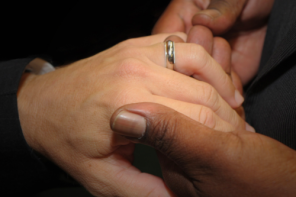When I was growing up within the evangelical subculture in the 1960s and 1970s, I regarded evangelicalism and political liberalism as both complementary and mutually reinforcing—a conviction that, despite current prevailing sentiments, I hold to this day. If you take seriously the words and example of Jesus in the New Testament, for instance, it’s pretty difficult to be a militarist or turn a blind eye to racial injustice or socioeconomic inequalities. The fact that Jesus expressed concern for the tiniest sparrow, in my minority opinion, suggests the need to safeguard the environment against heedless exploitation.
Even then, before the rise of the Religious Right in the late 1970s, I had precious few role models, especially among elected officials. Mark Hatfield was one.
Hatfield, who died last Sunday, served thirty years in the United States Senate, from 1967 until 1997. Before that, he was secretary of state and then governor of Oregon. He was a devout Baptist of the traditionalist variety—that is, he understood the importance of the historical Baptist convictions about the separation of church and state—although he once confided to me toward the end of his Washington career that he regularly stopped into a local Roman Catholic church on Capitol Hill.
At a meeting of the National Governors Association in 1965, Lyndon Johnson applied his trademark pressure to secure a unanimous resolution in support of the War in Vietnam. Despite the president’s strong-arm lobbying, however, Mark Hatfield was the sole dissenter. As senator several years later, Hatfield teamed with Democratic senator George McGovern of South Dakota to draft the McGovern-Hatfield Amendment to End the War in Vietnam.
Hatfield’s liberal positions earned him the enmity of many politically-conservative evangelicals. But he remained resolute in his convictions, pushing for nuclear disarmament, environmental protection, aid for the poor and federal funding for medical research.
I encountered Hatfield for the first time when I was a senior in college in the fall of 1975 at an extension program in southern Oregon. Our small group of students had spent a couple of days on the Oregon Coast, and on our way back to Ashland we stopped for dinner. Hatfield was conducting a meeting with constituents in an adjacent room, and the director of our program, called the Oregon Extension, stopped in to introduce himself.
Seventeen years later, I interviewed Hatfield in his Washington office for a PBS documentary on Billy Graham. As the cameras were setting up, I casually mentioned that I had spent a glorious semester in Oregon seventeen years earlier. “Oh yes,” the senator replied without missing a beat. “I think I met the head of that program at a restaurant a while back.”
That exchange started us talking about faith and politics. We commiserated about the toxic influence of the Religious Right and how it had distorted our understanding of the faith. Hatfield invited me to stop by whenever I came to Washington. One time we had a private lunch in his hideaway office in the Capitol. He always asked about my sons by name, and on another visit I brought my older son, not yet ten years old, who sat behind the senator’s desk and posed for a photo. When my sons and I stopped by Portland on vacation, the senator and his wife took all three of us to dinner.
When he decided not to seek reelection in 1996, Hatfield complained that his party, the party of Abraham Lincoln, whom he much admired, had been taken over by “Converted Confederates.” A year earlier, Hatfield had been his party’s lone holdout on the proposed “Balanced Budget Amendment” to the Constitution. Had he voted in favor, the amendment, one of key features of Newt Gingrich’s “Contract on America,” would have passed. Hatfield could not in good conscience support something he considered deleterious to the nation, but he also recognized how important the legislation was to members of the Republican Party.
Although he could not vote for the measure, Hatfield approached the majority leader, Robert Dole, and offered to resign his Senate seat so that the Republicans could claim the legislative victory they so coveted. Dole wisely refused the offer, and the measure failed.
The remarkable life and distinguished career of Mark Hatfield reminds us of a time, not that long ago, when “liberal Republican” was not an oxymoron. He may, in fact, have been the last of that breed. But his passing also reminds us that the venerable tradition of what I call prophetic evangelicalism—environmental concern, suspicion of war, care for those Jesus called “the least of these”—no longer has a champion in the corridors of power.



